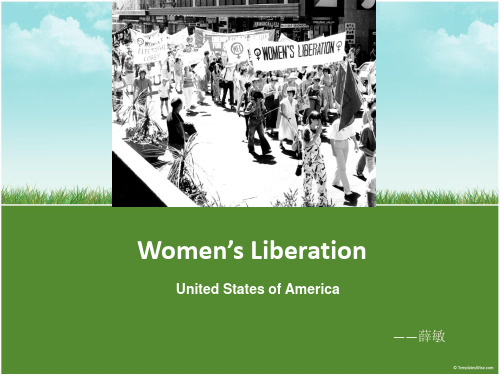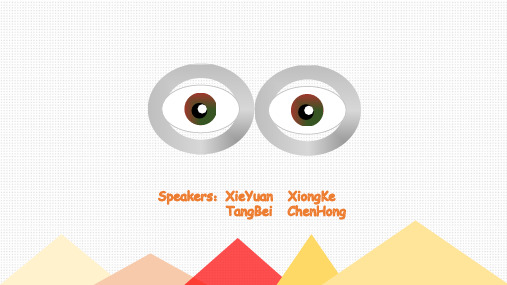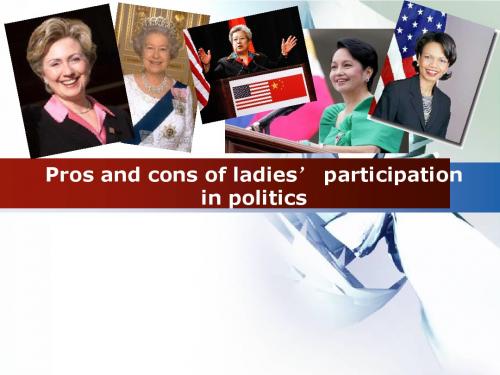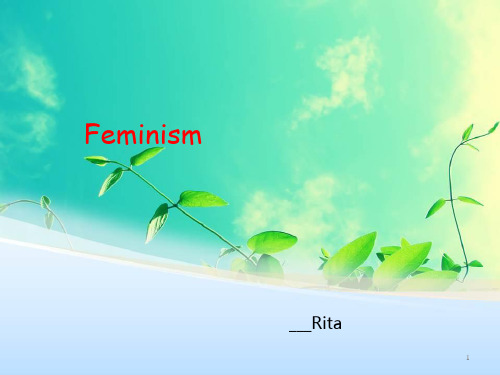女权主义英语演讲稿ppt课件
- 格式:ppt
- 大小:1.66 MB
- 文档页数:11






世界著名女权英文演讲星星美丽Today we are launching a campaign called “He For She.”I am reaching out to you because I need your help. We want to end gender inequality—and to do thatwe need everyone to be involved.This is the first campaign of its kind at the UN: we want to try and galvanize as many men and boys as possible to be advocates for gender equality. And we don’t just want to talk about it, but make sure it is tangible.I was appointed six months ago and the more I have spoken about feminism the more I have realized that fighting for women’s rights has too often become synonymous with man-hating. If there is one thing I know for certain, it is that this has to stop.For the record, feminism by definition is: “The belief that men and women should have equal rights and opportunities. It is the theory of the political, economic and social equality of the sexes.”I started questioning gender-based assumptions when ateight I was confused at being called “bossy,” because Iwanted to direct theplays we would put on for our parents—but the boys were not.When at 14 I started being sexualized by certainelements of the press.When at 15 my girlfriends started dropping out oftheir sports teams because they didn’t want to appear “muscly.”When at 18 my male friends were unable to express their feelings.I decided I was a feminist and this seemed uncomplicated to me. But my recent research has shown me that feminism has become an unpopular word.Apparently I am among the ranks of women whose expressions are seen as too strong, too aggressive, isolating, anti-men and,unattractive.Why is the word such an uncomfortable one?I am from Britain and think it is right that as a woman I am paid the same as my male counterparts. I think it is right that I should be able to make decisions about my own body. I think it is right that women be involved on my behalf in the policies and decision-making of my country. I think it is rightthat socially I am afforded the same respect as men. But sadly I can say that there is no one country in the world where all women can expect to receive these rights.No country in the world can yet say they have achieved gender equality.These rights I consider to be human rights but I am one of the lucky ones. My life is a sheer privilege because my parents didn’t love me less because I was born a daughter. My school did not limit me because I was a girl. My mentors didn’t assume I would go less far because I might give birth to a child one day. These influencers were the gender equality ambassadors that made who I am today. They may not know it, but they are the inadvertent feminists who are. And we need more of those. And if you still hate the word—it is not the word that is important but the idea and the ambition behind it. Because not all women have been afforded the same rights that I have. In fact, statistically, very few have been.In 1997, Hilary Clinton made a famous speech in Beijing about women’s rights. Sadly many of the things she wanted to change are still a reality today.But what stood out for me the most was that only 30 per centof her audience were male. How can we affect change in the world when only half of it is invited or feel welcome to participate in the conversation?Men—I would like to take this opportunity to extend your formal invitation. Gender equality is your issue too.Because to date, I’ve seen my father’s role as aparent being valued less by society despite my needing his presence as a child as much as my mother’s.I’ve seen young men suffering from mental illness unable to ask for help for fear it would make them look less “macho”—in fact in the UK suicide is the biggest killer of men between 20-49; eclipsing road accidents, cancer and coronary heart disease. I’ve seen men made fragile andinsecure by a distorted sense of what constitutes male success. Men don’t have the benefits of equality either.We don’t often talk about men being imprisoned by gender stereotypes but I can see that that they are and that when they are free, things will change for women as a natural consequence.If men don’t have to be aggressive in order to beaccepted women won’t feel compelled to be submissive. If men don’t have tocontrol, women won’t have to be controlled.Both men and women should feel free to be sensitive.Both men and women should feel free to be strong… It is time that we allperceive gender on a spectrum not as two opposing sets of ideals.If we stop defining each other by what we are not andstart defining ourselves by what we are—we can all be freer and this is what He For She is about. It’s about freedom.I want men to take up this mantle. So their daughters, sisters and mothers can be free from prejudice but also so that their sons have permission to be vulnerable and human too—reclaim those parts of themselves they abandoned and in doing so be a more true and complete version of themselves.You might be thinking who is this Harry Potter girl? And what is she doing up on stage at the UN. It’s a good question and trust meI have been asking myself the same thing. I don’t know if I am qualified to behere. All I know is that I care about this problem. And I want to make it better.And having seen what I’ve seen—and given the chance —I feel it is my duty to say something. English states man Edmund Burke said: “All that is needed for the forces of evil to triumph is for enough good men and women to do nothing.”In my nervousness for this speech and in my moments of doubt I’ve told myself firmly—if not me, who, if not now, when. If you have similar doubts when opportunities are presented to you I hope those words might be helpful.Because the reality is that if we do nothing it will take 75 years, or for me to be nearly a hundred before women can expect to be paid the same as men for the same work. 15.5 million girls will be married inthe next 16 years as children. And at current rates it won’t be until 2086 before all rural African girls will be able to receive a secondary education.And for this I applaud you.We are struggling for a uniting word but the good newsis we have a uniting movement. It is called He For She. I am inviting you to stepforward, to be seen to speak up, To be the he for she. And to ask yourself, if not me, who? if not now, when?Thank you.。
Ladies and gentlemen,Good morning/afternoon/evening. Today, I stand before you to talk abouta crucial issue that has been affecting our society for centuries: gender inequality. We have come a long way, but there is still much work to be done to achieve true gender equality. In this speech, I will discuss the importance of gender equality, the challenges we face, and the steps we can take to promote a more equitable world.Firstly, let's define what we mean by gender equality. Gender equality refers to the equal rights, responsibilities, and opportunities of women and men in all aspects of life. This includes economic, political, social, and cultural spheres. Gender equality is not just a women's issue; it is a human rights issue that affects everyone.The importance of gender equality cannot be overstated. A world where men and women are treated equally is a more just and prosperous world. Gender equality can lead to:1. Economic growth: When women have equal access to education, employment, and entrepreneurship, they can contribute to the economy in significant ways. According to the World Bank, if women were to participate in the labor force at the same rate as men, global GDP could increase by 26% by 2030.2. Healthier societies: Gender equality can lead to better health outcomes for both men and women. When women have access to reproductive health services and can make decisions about their bodies, they are more likely to lead healthy lives. Additionally, gender equality can lead to better child nutrition and health.3. Stronger communities: Gender equality can lead to more stable and peaceful societies. When women have a voice in decision-making processes, communities are more likely to be inclusive and resilient.Despite the many benefits of gender equality, we still face significant challenges. Here are some of the main issues:1. Pay gap: Women are still paid less than men for doing the same work. According to the World Economic Forum, the global gender pay gap is 23%, and it will take another 99.5 years to close it at the current rate.2. Gender-based violence: Women and girls around the world continue to face violence and discrimination, including domestic violence, sexual harassment, and female genital mutilation.3. Lack of representation: Women are underrepresented in leadership positions in both the public and private sectors. This lack of representation can lead to a lack of diverse perspectives and hinder progress.So, what can we do to promote gender equality? Here are some steps we can take:1. Education: Education is key to achieving gender equality. By ensuring that girls have equal access to education, we can empower them to make informed decisions about their lives and contribute to their communities.2. Economic empowerment: We need to ensure that women have equal access to economic opportunities, including employment, entrepreneurship, and credit.3. Policy change: Governments need to implement policies that promote gender equality, such as equal pay laws, parental leave policies, and measures to address gender-based violence.4. Cultural change: We need to challenge harmful stereotypes and promote positive images of women in media and society.5. Men's involvement: Men have a crucial role to play in promoting gender equality. By supporting women's rights and challenging harmful gender norms, men can help create a more equitable world.In conclusion, gender equality is a vital issue that affects us all. By working together, we can overcome the challenges we face and create a more just and prosperous world. Let us embrace gender equality and take the necessary steps to make it a reality.Thank you.。